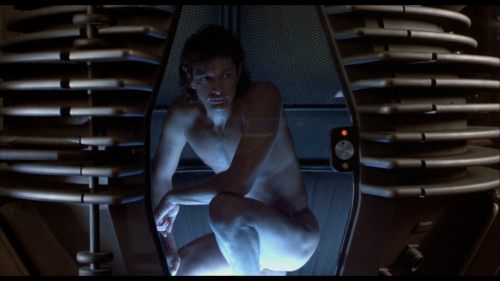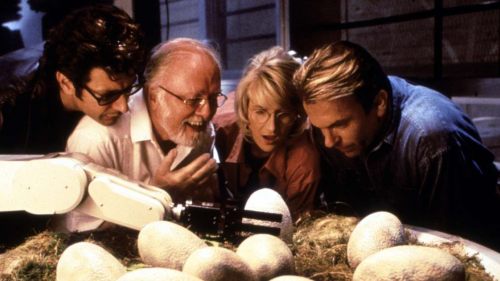SXSW Review: THE MOUNTAIN May Be Too Oblique For Its Own Good
There is a young man whose facial expressions are all but inscrutable, as are the interactions with his stone-faced German father (Udo Kier) who teaches ice skating at a local rink, where the young man drives a zamboni and sharpens the skates. Were it not for what happens next, the young man's life would passively fade into the ether, but this is a movie and so there is a series of inciting incidents – if you can call them that. His father dies suddenly, and while selling his possessions for next to nothing, the young man encounters an older man named Wally (Jeff Goldblum) who hires him as his assistant and photographer. Wally is a traveling lobotomist, which puts the setting of The Mountain sometime in the ’50s – as reliance on the controversial procedure was diminishing due to rightful concerns over its dangers. Young Andy (Tye Sheridan) accepts the job offer ("We help them and then we take their picture," Wally says), in the hopes, perhaps, of finding his mother, whom Wally claims to have met and "treated" during his travels. What follows is a series of near-Lynchian encounters at various mental hospitals, where the majority of patients are women and Wally's procedure could be interpreted as an exertion of masculine dominance, forcing these willful women into submission. Or something like that.
Directed and co-written by Rick Alverson, The Mountain could be best summed up in the description of Sheridan's Andy: Impenetrable, passive, and strangely agitating in some undefinable sense. Alverson's previous films – Entertainment and The Comedy – were provocative dark comedies that explored the uncanny microcosms of intensely specific characters; both the characters and the films elicited discomfort, largely from a place of recognition, be it visceral or objective. The Mountain doesn't feel like a provocation in the overt sense, but a contemplation of sorts, one that juxtaposes an unassuming, otherwise pleasant era against the quiet horror of lobotomizing women for daring to have minds of their own. The contrast between the film's setting and its plot is jarring and perhaps best exemplified in the soundtrack; "Blue Moon" loses its gentility and becomes eerily foreboding, for instance. In this way, it reads as Alverson's attempt to make a David Lynch film, but the end result is far more enigmatic – almost too enigmatic, to the point where one wonders if there is a point at all.
Though The Mountain is ostensibly about Andy, it's Wally who gives us the most insight into Alverson's intentions. Wally is a classic narcissist and functioning alcoholic who postures himself as an intellectual. His lobotomy practice allows him to subjugate minds he perceives as inferior, and Andy – whom we understand to be but one in a long line of "assistants" – is only useful to him as long as he remains submissive. But Andy is clearly on some journey, be it toward self-discovery or filling the mother-shaped void in his life. His usefulness has an expiration date that quickens when he meets a young mental patient named Susan (Hannah Gross), whose willfulness and opinions have become a burden to her father (Denis Lavant, cranked up to 1200) – a man who is obviously far more psychologically afflicted than his daughter.
Alverson's style is more clinical than his previous efforts, and appropriately so, calling to mind the work of David Cronenberg or Michael Haneke – though less viscerally engaging than either. If there is any provocation to be found in The Mountain, it's in the vague, nagging sense of agitation it elicits in the viewer. I found myself fidgeting constantly throughout the film; there was a restlessness, a low-key desire to crawl out of my own skin. And I wasn't the only one. It seems to be not only a shared response to the film, but possibly even the desired one on Alverson's part. Needless to say, it's not a pleasant experience. But if this was the reaction Alverson intended, then there might be something impressive at work in The Mountain because there is nothing overtly gross or antagonizing about what plays out on screen. Maybe his greatest achievement is in how he utilizes Goldblum, weaponizing his usual quirks against an audience so readily charmed by him. His flirtations and intellectual eccentricities become sleazy and borderline grotesque; there's a very fine line between charismatic and obnoxious. As such, this might be Goldblum's best role in years.
I'm not sure that there's much meaning to be mined from The Mountain; if there is, I'm still struggling to find it. But one word kept creeping into my mind: Colonialism. Goldblum's Wally is all intellectual posturing and arrogance, a well-dressed white man who profits off of the oppression of people in a lower economic and social class. By manipulating their brains, Wally subjugates his patients, makes them more pliant in a world dominated by white men, where emotions and opinions are viewed as a threat. As such, the majority of patients who were lobotomized throughout the late ’40s and into the ’50s were women and people of color. Wally appears to be inspired by Walter Freeman, the real-life doctor who invented the lobotomy. Though Freeman advocated for African American physicians, but he also felt that women and patients of color were the best candidates for lobotomies. As a character study of a man like Freeman, The Mountain is certainly intriguing, but given Alverson's tendency toward the oblique, it may be too impenetrable for its own good.



